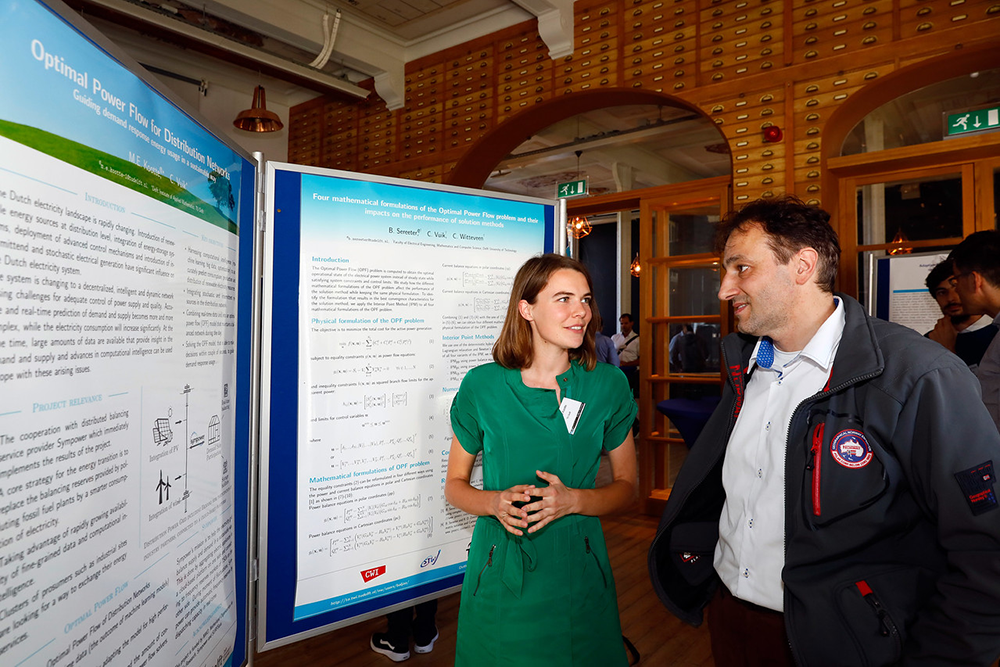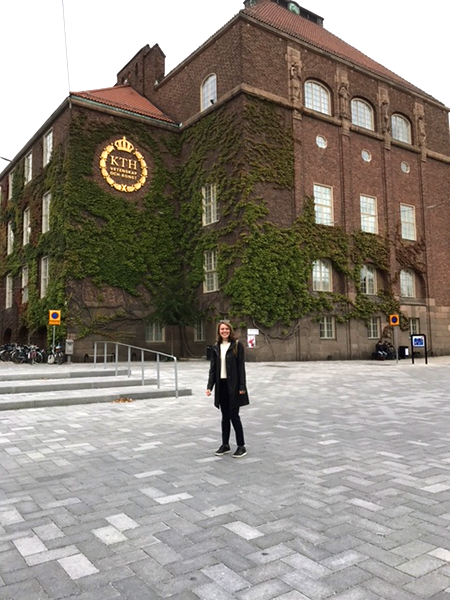Marieke returned to TU Delft for PhD studies
Marieke Kootte graduated from the master’s programme in Computer Simulations for Science and Engineering in 2017. After she finished her studies at KTH she moved back to the Netherlands for PhD studies at TU Delft.

Hi Marieke, what are you working on at the moment?
I am currently doing a PhD in Applied Mathematics at Delft University of Technology and partly at Sympower. Sympower is a start-up company that helps Transmission System Operators balance the electricity grid in a more sustainable way. They are partially funding my PhD project, which I am conducting at the Numerical Analysis department of TU Delft. My project focuses on the development of fast and efficient solvers for large electricity networks, especially on integrated transmission-distribution networks. This is becoming more important due to the rise of locally generated solar and wind power. I spend one day at Sympower to help them with all kinds of mathematical problems and for me this variation of a long-term PhD project and short-term problems helps me in keeping me motivated and excited about the job.

Why have you applied for this job?
I have always had an interest for all kinds of environmental problems. Before I switched to the master’s of Applied Mathematics, I obtained a bachelor’s degree in Civil Engineering. During my studies I had the chance to do an internship at a company working on ocean thermal energy conversion, I also did a – seemingly funny, but actually very important – case-study on the contamination of drinking water by XTC-waste, and I graduated at the Swedish Meteorological Hydrological Institute where I worked at the climate research department. I really enjoyed my time here and here my interest for doing research started there. Furthermore, I have always liked the enthusiasm of start-ups and their passion to establish the next innovation. I admire their endless willpower and the atmosphere among start-ups keeps me very energetic. This PhD combines all my interests, so that’s why I decided to do so.
Why did you choose this programme at KTH?
I did the master's programme in Computer Simulations for Science and Engineering (COSSE), a specialization of Applied Mathematics, which was a joint double degree program between KTH and TU Delft. I obtained a bachelor’s in Civil Engineering at TU Delft and I wanted to do a master’s degree in Mathematics. The COSSE programme is especially designed for people with an engineering background that want to specialize in mathematics. When I heard I had to study one year abroad in either Stockholm or Berlin, I knew immediately that I wanted to go to Stockholm. I had visited the city before and I really liked the Swedish culture. They appreciate a high quality of life, are all super friendly (“I remember loving the ‘Hej’ I received everywhere I entered”) and modest at the same time. On top of this, Stockholm is a beautiful city and KTH a great University. I was sure I would have a great time.
Are there any insights or knowledge you acquired during your studies that have been extra useful for you in your career?
During my internship at SMHI I think I best got to know the Swedish working culture. Everyone was working so relaxed and taking time, while still delivering work in time and of high quality. The coffee breaks were taken very seriously and the lunch break lasted at least one hour. Here in the Netherlands, we’re tending to rush our lunch to continue our work while in Sweden you really take time to have a proper meal and some rest afterwards with coffee. I think it is really valuable to take a long break in between your working hours to boost your energy and creativity for the afternoon. My colleagues also tried to stay relaxed during the rest of the day by going for a walk regularly. With the Swedish nature so close to you everywhere, this is really a treat! I’ve spent many hours going for a run during my time at KTH, because as soon as you leave the M-building you are in nature and you can run around the beautiful lake so close by! I try to continue this working attitude in my current job as well.

What was the best aspects of your studies at KTH?
Although I spent only one semester on courses and the other semester on graduation, I really got to do a lot of interesting and varying courses. The programme was really flexible in designing your own track, so I got to do courses from philosophy, mathematics and water management. Especially the latter was interesting, because it gave me the ability to apply mathematics on an actual practical topic, the XTC-contamination. Another aspect I really liked was the very international environment. A lot of societal parties, like the rowing club, were really aimed at integrating the international students. I think that is pretty cool!

What is your best memory from your time at the universities?
That must be the graduation ceremony! It is so special to get your certificate in the Stockholm City hall, where one week earlier the Nobel Laureates had dinner! In Delft, the graduation ceremony is solely an individual event, while here so much effort is taken to unite all the students from KTH with a very special ceremony.
What are your plans for the future?
I have three more years to finish my PhD, so I am not really thinking about my plan afterwards at the moment. But I think I want to continue applying my mathematical knowledge on water and environmental problems. The course I took at KTH really sparked my enthusiasm and because we had to conduct a real-life case I got in contact with several parties that were really interested in continuing this project on a more serious basis. Another interesting company that I got to know because of my time in Sweden, was the Stockholm Environment Institute. Although I haven’t decided yet, my year in Stockholm has really influenced my interests and choices so far. I think one year abroad really urges you to step out of your comfort-zone because you cannot rely on your former friendships and activities. It also gives you time to reflect and think about what you really want. So I think that’s why one year can make a big impact compared with many years spent in your native country.
